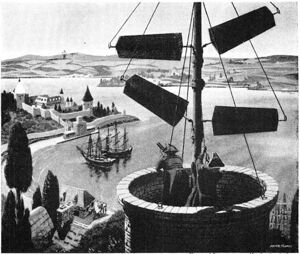Semaphore telegraph (nonfiction)
A semaphore telegraph is a system of conveying information by means of visual signals, using towers with pivoting shutters, also known as blades or paddles.
Information is encoded by the position of the mechanical elements; it is read when the shutter is in a fixed position.
The most widely used system was invented in 1792 in France by Claude Chappe, and was popular in the late eighteenth to early nineteenth century.
They were much faster than post riders for conveying a message over long distances, and also had cheaper long-term operating costs, once constructed.
Semaphore lines were a precursor of the electrical telegraph, which would replace them half a century later, and would also be cheaper, faster, and more private.
The distance that an optical telegraph can bridge is limited by geography and weather; thus, in practical use, most optical telegraphs used lines of relay stations to bridge longer distances. This also prevented the optical telegraph from crossing wide expanses of water, unless a convenient island could be used for a relay station.
Modern derivatives of the semaphore system include flag semaphore (a flag relay system) and the heliograph (optical telegraphy using mirror-directed sunlight reflections).
In the News
Fiction cross-reference
Nonfiction cross-reference
External links:
- Semaphore line @ Wikipedia
- Prussian semaphore system @ Wikipedia

